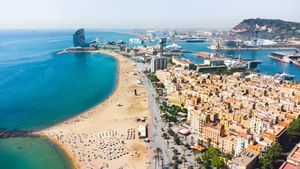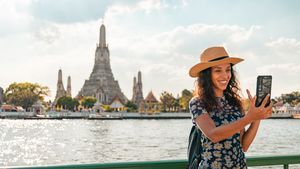
Explore India to Dubai Traveling: An Informative Guide for First-Time Travelers
Traveling from India to Dubai has become a popular route for different purposes, including tourism, business and visitor families. The journey is present due to close geographical proximity, strong economic conditions and cultural relationships between India and the United Arab Emirates. As one of the world's most modern and demanding travel sites, Dubai's appeal for Indian travelers lies in its unique mix of future architecture, luxurious lifestyle and a welcome environment. A well -planned journey requires understanding of large travel formalities, which may first seem complicated to those who start this trip. This guide is designed to simplify the process and provide a clear observation of what can be expected.
The route to New Delhi, India, Manila, the Philippines, combines two large Asian capitals with different cultures, history and economic interests. Since the international journey is resumed strong post-pandemic, the route gains popularity among tourists, students, professionals and migrants.
Flights between these two cities serve many goals - from holidays and family trips to commercial trips and educational activities. Manila serves as the capital and main entrance of the Philippines and New Delhi, a central center of India, direct and connection flights play an important role in enabling people's conditions and regional connection to people in the South East and South Asia.

Why does this travel route mean something today
This travel route has become important for several reasons:
-
Rising tourism and holidays: Several Indians search for Southeast Asia, and the Philippines has emerged as a beach and natural destination.
-
Educational Opportunity: Filipino University attracts Indian students in fields as a medical and dentist.
-
Business and Business: IT, BPO and financial sector companies support more in both countries.
-
Philippine diaspora: Many Philippine citizens live and work in India, and vice versa, and require travel for family and personal reasons.
That affects it
-
Indian and Filipino citizens
-
Students, tourists and professionals
-
Families with cross -border connections
-
Travel planner, tour operator and embassy personnel
Problems help resolve this information
-
Uncertainty about flight options or restrictions
-
Confusion around visa rules and entry policy
-
Lack of update trips or lack of equipment
New Delhi - Manila Travel Update (2024–2025)
Last year, many developments have affected the travel scenario on this route:
-
Duration of travel:
-
With stop: almost 10–14 hours depending on the airline and the large location
-
No direct flight: At the moment, no daily non-stop service. Most routes include 1 or 2 transition.
-
Visa rules and travel agents for both countries
Admission requirements for Philippine citizens traveling to India:
-
Accessibility of e-visa: Philippine citizens can apply for an Indian e-visa (tourism, medicine or business) on the web before the trip.
-
Documents Requirements: Passport, travel, hotel booking, financial evidence.
-
Visa Period: Tourists e-vis are usually valid for 60 days per trip.
Health and Safety Guidelines (as of 2025)
-
Covid-19 vaccination certificates are usually not necessary, but may be asked for specific obesity countries.
-
Passengers are recommended to investigate the requirements for transit countries, especially for PCR tests or travel insurance.
Accessories and travel trips
Here are useful equipment and platforms to help passenger aircraft, manage documents and be informed:
Flight Eachetor:
-
Google Flights
-
Skyscanner
-
Kayak
-
Expidia
-
McMitrip
-
Clearrip
Airlines operating the route (with stopover):
-
Singapore Airlines
-
Thai Airways
-
Malaysia Airlines
-
run
-
Indigo (connects through Southeast Asia)
-
Philippine Airlines (current charter or kodasare)
Visa-application platform:
-
Indian e-vis portal
-
Philippine Embassy India
-
VFS Global (for document submission)
Travel planning apps:
-
Google Map (to navigate Manila)
-
Rome2rio (for multi-foot transport planning)
-
Tripit (for the travel program)
-
Xe currency (for real-time exchange rates)
-
ONE
-
Mygate or Aarogya Setu (India-Specifics App for Travelers)
Weather waking:
(information placeholder)
Frequently asked questions
1. What is the average cost of a return ticket?
Prices vary according to weather and airlines. The price in the financial class trip return ranks from 28,000 (55,000 (USD 330–660) based on pre-booking and travel dates.
2. Need Indian citizens visa to visit the Philippines?
Yes, Indian passports usually require a visa unless they have a valid visa for selected third countries (eg the United States, the UK). Visa-free entrance is allowed for 14 days under certain conditions.
3. What is commodity politics on these routes?
The goods allowance depends on the airline. Most full service bearers allow 20–30 kg of check articles and 7–10 kg cabin products. Low cost airlines may require an extra fee for checked goods.
4. What is the time of travel between New Delhi and Manila?
Depending on the number and duration of stops, specific travel time is between 10 and 14 hours. Some sharp routes include Nowover in Bangkok or Singapore.
Final thoughts
Traveling between New Delhi and Manila has become more accessible to regional air connections, better visa processes and increasing mutual interest between India and the Philippines. Although there are no daily direct flights yet, passengers have many options through the regional hub.
Whether you are planning a holiday, business trips or family trips, being informed of visa requirements, airlines and available equipment, can make your journey more smooth and more fun. Always check the updated travel advisors and plan on level, the last room and documentation.










